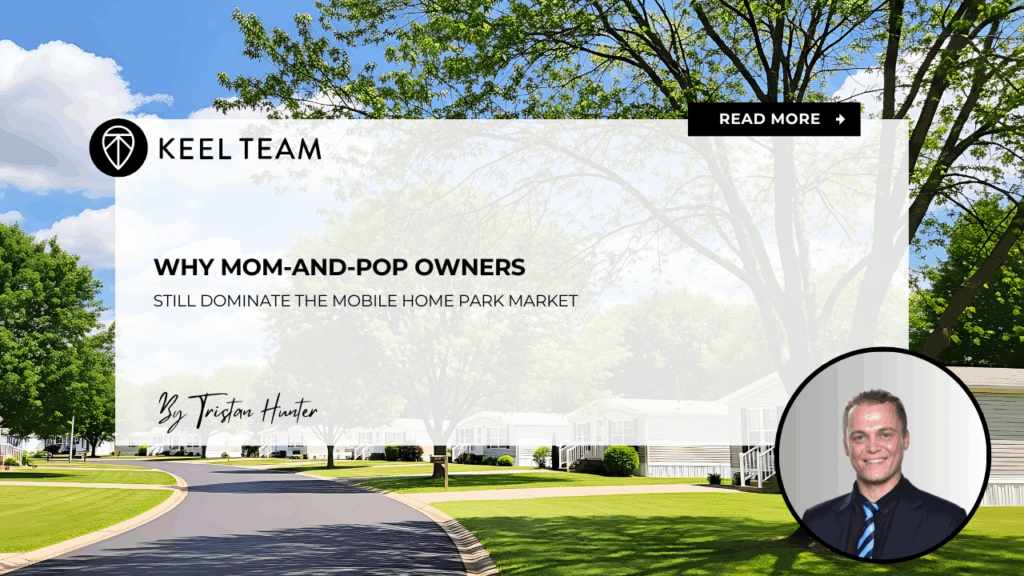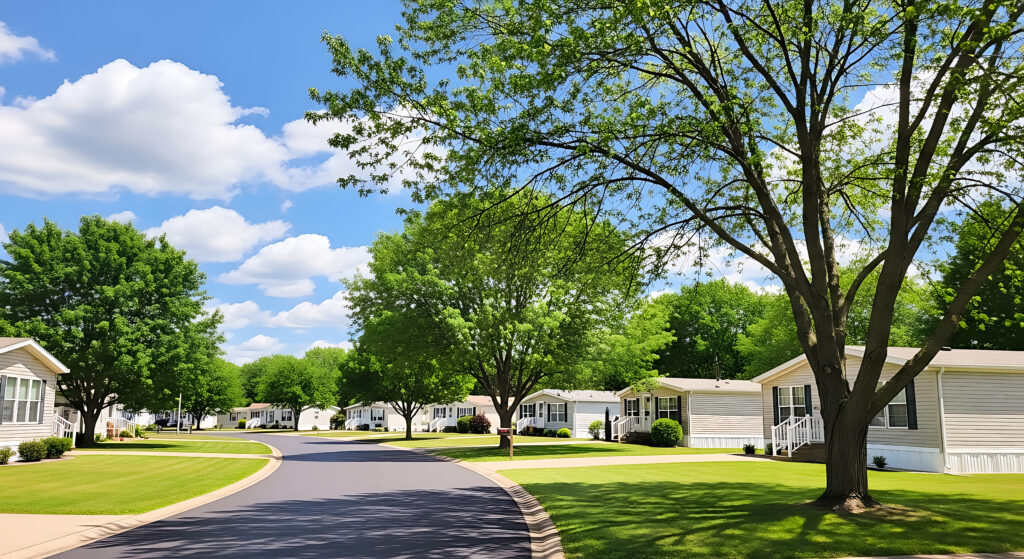Why Mom-and-Pop Owners Still Dominate the Mobile Home Park Market
-
 Tristan Hunter - Investor Relations
Tristan Hunter - Investor Relations

In the mobile home park industry, you might assume that institutional investors or private equity firms have already taken over. However, that is not yet the case. A large share of mobile home parks remain in the hands of “mom-and-pop” owners (i.e. small, often family-run operations). While trends are shifting, many of the underlying reasons why mom-and-pop operators still dominate are structural, behavioral, and economic. In this article, we explore why mom-and-pop owners typically dominate the mobile home park ownership market.
The Scale and Fragmentation of the Mobile Home Park Market
A Highly Fragmented Landscape
One of the primary reasons mom-and-pop owners dominate is that the mobile home park sector is extremely fragmented. Public and institutional players own only a modest share. According to one analysis, roughly 25 % of the manufactured housing (mobile home) community market is held by institutional owners, leaving about 75 % fragmented across private, often smaller, owners. Another source estimates over 90 % of mobile home parks are still held by mom-and-pop operators. This fragmentation creates far more “nooks and crannies” for smaller owners to persist.
Transactions in the mobile home park world are less visible, and many deals occur off-market or through personal networks. Because of this, institutional funds and large aggregators often face difficulty sourcing deals in smaller or “hidden” parks. This opacity benefits long-time local owners who already have networks and local insight.
Download our FREE eBook on the Top 20 things to know BEFORE investing in mobile home parks!
Legacy Ownership and the Barrier to Exit
Many mom-and-pop owners bought mobile home parks decades ago when competition was limited. Over those years they may have built equity, paid down debt, or benefited from inflation and rent growth. In effect, their “cost basis” is low. Some do not actively seek to sell, especially if the cash flow is steady.
Furthermore, selling a mobile home park is not simple: financing, regulatory hurdles, environmental issues, and resident sensitivities make the exit process complex. Some mom-and-pop owners simply prefer to hold rather than navigate a complex sale process. That inertia helps maintain their dominance in the sector.
Lower Operational Requirements Favor Smaller Owners
Lower Capital Expenditures and Maintenance Burdens
Unlike multifamily or industrial assets, many mobile home parks have reduced capital burden because the residents often own their own homes. The operator is typically responsible only for land, infrastructure (roads, utilities, sewer, common areas), and community maintenance—not the internal structure of each dwelling. Because of this model, operating costs and capital requirements can remain more manageable, even for smaller operators.
That relative simplicity helps smaller operators stay afloat without needing large management platforms, large staffs, or heavy debt loads. A mom-and-pop owner can often manage with a lean team, or even contract out services, without the complexity that larger real estate firms typically require.
“Sticky” Residents with Low Turnover
Another structural advantage that helps small owners maintain control is the high residency stability in mobile home parks. Because moving a mobile home is costly and complex, many residents stay in place for long periods—some studies suggest average tenancies of 10+ years, far longer than in apartment markets. 52TEN+2MHPinvestors+2 This stickiness reduces turnover costs (cleaning, repair, vacancy) and gives predictable cash flow.
When turnover is low, an owner doesn’t need to spend as much on marketing, tenant acquisition, or expensive renovations between tenants. That dynamic again levels the playing field for mom-and-pop operators, who typically lack the large marketing and leasing engines of institutional firms.
Behavioral, Psychological & Economic Incentives
Emotional Attachment and Local Identity
Many mom-and-pop owners have emotional ties to their community. Maybe they built it, lived nearby, or see the park as a family legacy. Such owners may resist offers that would force them to give up control. The sense of pride, personal connection, and community relationships can outweigh pure financial optimization for them.
Likewise, local knowledge (zoning rules, resident relationships, reputations) gives smaller players advantages that are hard for outsiders to replicate quickly.
Under-optimization and Value Gaps
Because many mom-and-pop owners have run their parks conservatively over many years, they often have underutilized upside. For instance:
- Rents might never have been adjusted to market levels, or they may lag inflation for decades.
- Some parks may have vacant lots or parcels not fully monetized.
- Utility billing practices or lot-usage optimizations may not have been modernized.
These inefficiencies mean that sophisticated operators see opportunity to “tidy up” and raise performance. But until those operators acquire them, mom-and-pop owners remain in place, riding on the baseline cash flow.
Favorable Financing Opportunities with Seller Terms
One advantage when buying from mom-and-pop owners is seller financing. Because smaller owners often have little or no remaining debt, they may be willing to carry a note for a portion of the sale price rather than require third-party financing. FlipNerd notes that many mom-and-pop sellers “have little to no debt … making the properties prime candidates for owner financing,” which simplifies acquisitions. This helps buyers bridge gaps or avoid aggressive bank underwriting hurdles.
Also, because mom-and-pop owners sometimes are less driven by maximum valuation, buyers may acquire parks below “textbook market value” while sellers retain monthly income streams. This dynamic again tends to allow smaller acquisitions by private investors, rather than setting the field for big institutional players only.

Challenges to Institutional Domination & the Window of Change
Barriers to New Supply & Zoning Constraints
One reason the mobile home park class is appealing—and also that it stays dominated by smaller owners—is that creating new mobile home parks is extremely difficult. Regulatory, zoning, local opposition (NIMBY), utility access, and political hurdles make new developments rare. The limited new supply means that existing parks hold long-term value, which favors existing owners rather than fresh large-scale developers.
Increasing Institutional Interest & Consolidation
Still, the dominance of mom-and-pop ownership is not permanent. Institutional interest is increasing. Private equity firms, real estate investment trusts (REITs), and large aggregators are actively buying mobile home parks, especially larger ones. But many of these acquirers look at larger, high-scale communities first, leaving many smaller, under-the-radar parks untouched—at least for now.
The industry is beginning a phase of consolidation, but this will likely unfold over many years. Mom-and-pop owners will continue to dominate the “long tail” of small parks for awhile—unless or until institutional players can standardize operations, finance, and scalability at a lower minimum size.
Data Gaps, Reporting Inconsistencies & Information Asymmetry
Another obstacle for big players is the lack of reliable data. Because mobile home park recording varies by jurisdiction (some states record communities as single parcels, others subdivide, etc.), no one has perfect visibility into how many parks exist or who owns them. Without a robust database or standardized reporting, institutional investors often face difficulty sourcing deals, underwriting risk, or scaling across jurisdictions. Mom-and-pop operators, being local, do not need perfect industry visibility.
What This Means for Investors & Owners
For Aspiring Investors
If you are considering investing in mobile home parks, understand that much of the opportunity lies in acquiring smaller, under-managed parks from mom-and-pop owners. Because many such owners are not actively optimizing, there may be pricing inefficiencies or operational upside available. However, you should proceed carefully: due diligence is critical, and not every mom-and-pop property can be uplifted.
For Mom-and-Pop Owners
If you are a mom-and-pop owner, your position is currently strong. You can retain control, benefit from low cost basis, and enjoy steady cash flow. That said, you may also consider whether operating scale, systems, or exit planning could help you capture more value if you choose to sell in the future.
The Slow Shift Ahead
While mom-and-pop owners currently dominate the mobile home park market, that dominance is not guaranteed to persist indefinitely. Institutional interest is rising, consolidation is beginning, and better technology and capital pools may gradually pull even small communities under professionally managed umbrellas. But as of now, the many structural, behavioral, and economic advantages maintain the stronghold of mom-and-pop ownership.
Conclusion
Mom-and-pop owners remain the backbone of the mobile home park industry thanks to a combination of fragmentation, low operating complexity, legacy ownership structures, resident stickiness, and behavioral factors. While the tide may slowly shift toward more institutional ownership over time, the many challenges and inefficiencies protect the position of smaller owners—for now. For investors, the legacy dominance of mom-and-pop operators represents both opportunity and caution: there is potential upside to be unlocked, but success often depends on careful underwriting, operations, and local insight.
Are you looking for MORE information? Book a 1-on-1 consultation with Andrew Keel to discuss:
- A mobile home park deal review
- Due diligence questions
- How to raise capital from investors
- Mistakes to avoid, and more!
Disclaimer:
The information provided is for informational purposes only and is not investment advice or a guarantee of any kind. We do not guarantee profitability. Make investment decisions based on your research and consult registered financial and legal professionals. We are not registered financial or legal professionals and do not provide personalized investment recommendations.

Tristan Hunter - Investor Relations
View The Previous or Next Post
Subscribe Below 👇





